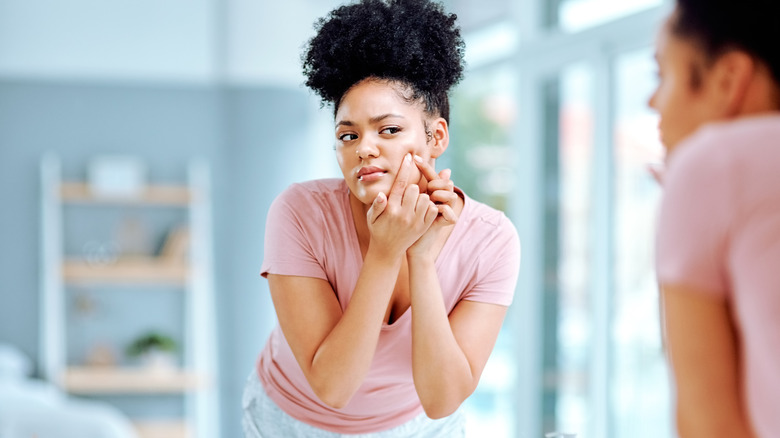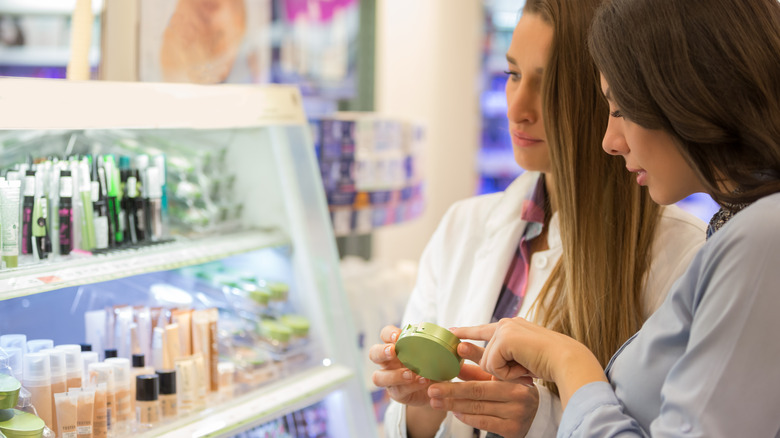The Most Common Makeup Myth About Breakouts Has A Shred Of Truth
We may receive a commission on purchases made from links.
Makeup is often blamed for acne, and many experts go as far as saying you should avoid putting anything on your face during a breakout. But, as you probably know, there are plenty of false facts about makeup on the internet and beyond. Makeup in itself doesn't cause acne, but certain ingredients can trigger flare-ups and affect skin health. Clinical evidence suggests that acne is due to a combination of factors, including age, sex, genetics, skin type, and hormone levels.
Smoking, drinking, and other lifestyle factors come into play, too, according to 2020 research published in the journal Frontiers in Public Health. Surprisingly, even sleep deprivation and the long-term use of electronics can lead to breakouts. For example, smartphones and tablets emit short-wavelength light, which may promote the spread of Staphylococcus aureus, a bacterium that can cause acne. Scrolling on your phone or tablet at night may further increase the risk.
As the researchers note, certain beauty products are more likely to cause acne than others, depending on their texture, composition, and frequency of use. You also need to consider your skincare regimen. Common mistakes, such as sleeping with your makeup on or using harsh cleansers, can make things worse.
The complex relationship between makeup and acne
When you're in the midst of a breakout, it can be tempting to cover up those unsightly bumps with makeup. The question is, could this habit worsen your acne? What about the long-term impact of makeup on skin health? "Acne is caused by hormones, oil production, and inflammatory bacteria. If you are already predisposed to breakouts, makeup can make it worse — particularly oil- or liquid-based foundations," dermatologist Mona Gohara, M.D., explained to SELF. Additionally, your skin is more sensitive during a breakout and may react badly to cosmetics, including those you normally use.
However, not all makeup will cause or worsen acne, according to 2018 evidence presented in the Journal of the European Academy of Dermatology and Venereology. The usual culprits are powder makeup, essential oils, and comedogenic, or pore-clogging, ingredients like cocoa butter, coconut oil, myristyl lactate, and oleic acid. Mineral makeup, in particular, may contain a comedogenic compound called ethylhexyl palmitate, which can cause breakouts. Many products are safe for acne-prone skin but can still trigger breakouts if used improperly.
A common mistake is applying layer upon layer of foundation or wearing makeup every single day. As dermatologist Joshua Zeichner, M.D., advised NBC News: "The overuse of makeup, especially foundations, can lead to skin irritation or acne breakouts. Taking a break from makeup can help the skin repair itself." This doesn't mean you have to go bare-faced for weeks but rather you'll use it less frequently and only if absolutely necessary.
How to prevent makeup-related acne
Just because your skin is prone to acne doesn't mean you should stop wearing makeup altogether. First, try to figure out which products or ingredients are causing your breakouts. Stay on the safe side and avoid primers, powders, heavy foundation, and any liquid makeup. Dermatologist Lily Talakoub also recommended switching to tinted, oil-free moisturizers, such as the Wet n Wild Bare Focus Tinted Hydrator during her chat with SELF. Go one step further and prep your skin with a cleanser before applying makeup.
Ideally, use a sponge or brush to apply foundation. Wash them with soap and warm water at least once a week, and replace them every three months or so. As a rule of thumb, remove your makeup and cleanse your skin at bedtime. Moreover, make sure you know when to throw out your makeup products. Expired cosmetics can harbor harmful bacteria, leading to breakouts, infections, and irritation. "All of the molecules in these products can break down into something else, and you can have a reaction to it," dermatologist Hadley King, M.D., warned Women's Health.
Last but not least, avoid wearing makeup while working out. Sweating opens up your pores. Foundation and other beauty products can mix with the sweat, bacteria, and debris on your skin, clogging your pores and causing breakouts. If you don't feel comfortable with a bare face, stick to a water-based foundation and mascara only. Cleanse your skin after working out, and then reapply your makeup if necessary.

